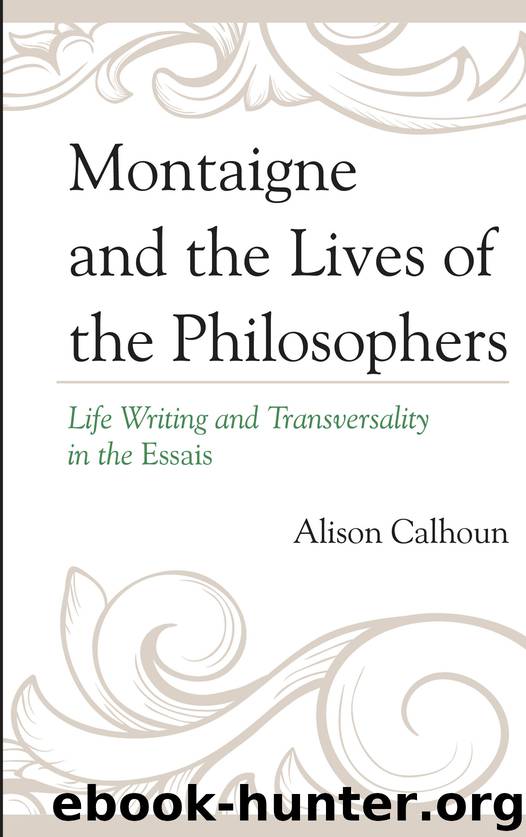Montaigne and the Lives of the Philosophers by Calhoun Alison

Author:Calhoun, Alison
Language: eng
Format: epub
Publisher: University of Delaware
Chapter 4
The Deaths of the Philosophers
[A] Le but de nostre carriere, c’est la mort, c’est l’object necessaire de nostre visée: si elle nous effraye, comme est il possible d’aller un pas en avant, sans fiebvre? Le remede du vulgaire c’est de n’y penser pas. Mais de quelle brutale stupidité luy peut venir un si grossier aveuglement? Il luy faut faire brider l’asne par la queue. (I.20.84)
[The goal of our career is death. It is the necessary object of our aim. If it frightens us, how is it possible to go a step forward without feverishness? The remedy of the common herd is not to think about it. But from what brutish stupidity can come so gross a blindness! They have to bridle the ass by the tail. (57–58)]1
Many of the biographical anecdotes in the Essais that we have not yet analyzed are about illness, dying, death, suicide, death sentences (in the case of Socrates and Seneca), and the final moments of a philosopher’s life. These types of accounts are one of the most numerous among the life-related narratives in Montaigne’s writing: the word mort [death] alone appears approximately five hundred times in the Essais, and mourir [to die] adds to this moribund tableau at 156 times. Just as Montaigne writes that he, like Diogenes Laertius, was as interested in the philosophers’ lives as he was their thought, so too he displays a keen fascination with their deaths. We might argue that for Montaigne, the ways in which great figures died was as significant, if not more significant, than the ways in which they lived. For example, he writes that there:
[A] n’est rien dequoy je m’informe si volontiers, que de la mort des hommes: quelle parole, quel visage, quelle contenance ils y ont eu; ny endroit des histoires, que je remarque si attantifvement. [C] Il y paroist à la farcissure de mes exemples: et que j’ay en particuliere affection cette matiere. Si j’estoy faiseur de livres, je feroy un registre commenté des morts diverses. Qui apprendroit les hommes à mourir, leur apprendroit à vivre. (I.20.90)
[is nothing that I investigate so eagerly as the death of men: what words, what look, what bearing they maintained at that time; nor is there a place in the histories that I note so attentively. This shows in the abundance of my illustrative examples; I have indeed a particular fondness for this subject. If I were a maker of books, I would make a register, with comments, of various deaths. He who would teach men to die would teach them to live. (62)]
While the beginning of the citation comes from the first edition, where Montaigne claims it is important to pay attention to accounts of men’s deaths, it is not until the C layer printed in the posthumous edition of his Essais that he underlines writing about death by suggesting that the most didactic books for living are those that deal with dying. In this insertion in the later edition, Montaigne indirectly promotes the role of his Essais in influencing the reader’s moral direction through commentary on death.
Download
This site does not store any files on its server. We only index and link to content provided by other sites. Please contact the content providers to delete copyright contents if any and email us, we'll remove relevant links or contents immediately.
Hit Refresh by Satya Nadella(9110)
When Breath Becomes Air by Paul Kalanithi(8409)
The Girl Without a Voice by Casey Watson(7873)
A Court of Wings and Ruin by Sarah J. Maas(7795)
Do No Harm Stories of Life, Death and Brain Surgery by Henry Marsh(6927)
Shoe Dog by Phil Knight(5243)
The Rules Do Not Apply by Ariel Levy(4945)
A Higher Loyalty: Truth, Lies, and Leadership by James Comey(4941)
Hunger by Roxane Gay(4915)
Tuesdays with Morrie by Mitch Albom(4754)
Everything Happens for a Reason by Kate Bowler(4724)
The Immortal Life of Henrietta Lacks by Rebecca Skloot(4567)
Millionaire: The Philanderer, Gambler, and Duelist Who Invented Modern Finance by Janet Gleeson(4449)
How to Change Your Mind by Michael Pollan(4340)
All Creatures Great and Small by James Herriot(4297)
The Money Culture by Michael Lewis(4175)
Man and His Symbols by Carl Gustav Jung(4117)
Elon Musk by Ashlee Vance(4111)
Tokyo Vice: An American Reporter on the Police Beat in Japan by Jake Adelstein(3967)
